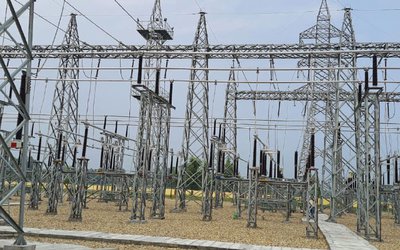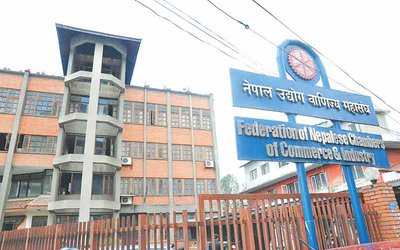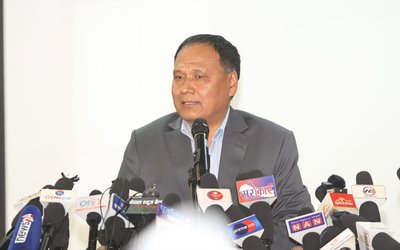
What programs will the students of small farmers engage in to benefit from the exchange program with Israel?
So far four batches of students have gone to Israel and three batches have already returned. Altogether 1150 students have already come back from Israel. These students have worked in five different academic centers in Israel from South to North. Four hundred thirty students are learning in Israel now. Southern Israel is a desert. The knowledge the students gained there is very important and significant. It is not necessary that all the students come back from Israel and get involved in the agriculture. What I can say is that an overwhelming majority are working in the agriculture sector applying the knowledge and skill learned in Israel. Agriculture does not necessarily mean agriculture farm only but it also involves livestock, poultry, fishery, horticulture and other related fields.
How do you see the agriculture in Israel?
The agriculture in Israel is entirely different, it is high tech and commercialized. It is big in size and technology based and it is professional as well. Our agriculture is still subsistence-based with small land holding. It is highly valuable and important for Nepalese young students to know about these aspects. Nepalese can be the game changers.
Why are you focusing on Agriculture?
Our experiences have already shown that we need to transform our agriculture sector to eradicate poverty and achieve a high economic growth. This is only possible when Nepalese start to think agriculture is for commercialization and it is a profession. For this, mechanization, high tech and commercialization are important factors. This is what one can learn in Israel. Those students who are going to Israel do agriculture. This program exposes them with most modern agriculture system.
How can you change agriculture in Nepal?
Agriculture is an industry and it is a profession. However, it is merely subsistence-based here. Former Israeli ambassador to Nepal Hanan Godder used to say agriculture is not a hobby but it is a profession. This is what Nepalese need to understand to make a bigger change in Nepal. If you say agriculture is a profession, you need to put all your efforts there. Nepalese students who are studying in Israel learn this by working with Israeli farmers. All Nepalese have to work five days a week in farm and one day in classroom where they are given practical courses, which include marketing aspects and other technological aspects.
Will Nepali students change?
If a young student works as the Israelis do, with hard work every day, why cannot we do such hard work in Nepal? Along with knowledge and skills, Nepalese students also come up with certain savings. With this hard earned money, they can start a startup company with a group of other colleagues.
Are those students returning from Israel working in agriculture sector?
As students going to Israel are the offspring of poor farmers, with small pieces of land, the exposure to Israel can open their eyes to what needs to be done to make farming commercial and professional. Given the past experiences what I understand is that those who return from Israel are now working collectively leasing the land and making their farms more valuable. Some of the returnees have already started the use of their knowledge and skills by leasing the land with commercial production. The students have already started to work in Dhading, Chitwan, Makwanpur, Jhapa, Siraha, Banke, Bardia and several other districts of Nepal. Given the recent experiences, what I can say is that these boys and girls from small farmers' family will bring several changes in the agriculture sector.
Why do they need to work in agriculture?
As they are from the family of farmers, they don’t have any easy chance other than to get involved in agriculture. This is a very profitable venture in the current state when Nepal is importing foodstuff from outside the country. The skill and knowledge the students learn in Israel is going to definitely bring the changes. Nepalese students who returned from Israel know that only hard work can pay agriculture and there is the need to have a big landholding to make it professional. They also learn productivity and export orientation as Israel is an export oriented country. I am not saying that all work in agriculture. If 10 to 20 percent are involved in agriculture, it will bring a major change in the livelihood. Nepali students also are expose in the very different and difficult environment. They learn technology of green house use of water and needs for high seeds as well as fertilizer.
How profitable is agriculture in Nepal?
Initially, expenditure of making farming may be higher in Nepal but it is likely to give more profit in due period of time. There is a high return in agriculture. We are giving priority to productivity and size of the farm. After training in Israel, young Nepalese farmer students come up with new plans and programs. Nepalese farmers also start what Israeli call a 'startup' in Nepal. We are ready to provide them counseling, technology and money.
How are the farmers responding to your program?
They are very positive and supporting us. As Sana Kisan Bikas Bank works with the consent of farmers, we always carry out the program on the basis of their consent. They are quite happy with this program. In the last six or seven years, we have gone to the farmers, whenever we start new programs. As we don’t impose anything on them, they are very happy with this program. As a bank manager, I don’t know the needs of farmers much and farmers know what fits in well with their profession.
Recently, your bank made certain arrangements with Kathmandu University to give the course an academic color. What is it?
This is the program we call 'learn and earn'. In the last three batches, all represent small farmer families, but all of them are students. We selected the person between 20 to 30 years with 12 grades. Following the arrangements with Kathmandu University, there is the need to fulfill the criteria required to get the degree. From this year, we have made a good collaboration with Kathmandu University. Now on, there is the need to have a certain degree for students, who can understand what they are taught in Israel as well. Israel is an old friend of Nepal with diplomatic relations since 1960. I am also proposing with Nepal government to bring experts in Nepal as well. They will demonstrate their work in some of the pockets. Government of Israel will be happy to help us even by sending their experts in Nepal for the time being.
At a time when a lot of Nepalese are leaving the country, particularly from small farmer families and returning without any tangible knowledge and skills, don’ t you think this program can also be replicated to other countries?
People are going to the Gulf countries, Malaysia and other parts of the world as manpower. It is unfortunate that an overwhelming majority of them are not manpower, but a capacity of labor. They come back here as labor. We receive very nominal remittances at the cost of valuable labor. However, their knowledge is not going to increase. Our program is completely different and it cannot be replicated as it has different provisions. All the students are attached with the college. They learn farm management, water management and so on. The students take many classes, this also gives them exposure. My impression is that all the teachers lecturing Nepalese students are masters and PhD holders. They have good background as teachers.
How many students are there?
We are sending the students from 35 districts. It will have larger implications. Tell me how many BSC agriculture and PHD are working in agriculture sector of Nepal. I don’t think any of them are there. There are hardly a few of them. Nepal’s agriculture is currently relying on illiterate farmers. Thus, we are unable to bring change. As agriculture is a very complex issue involving so many components, you need to have more people with knowledge and exposure to countries like Israel. They should know about fertilizer, water, seeds, market etc. We want to put the sincere knowledge of these farmers to work. I know our farmers are poor and what we need to do is to provide them better options to be rich. I have faith on them that they will ultimately bring change.
How do you coordinate the program?
Israeli government and Israeli Embassy and Ambassador Meyer have been very supportive to us. We have always remembered former Israeli ambassador to Nepal Hanan Godder for helping to launch this program. Although he is in Israel, we have been receiving his support. I have to say that without their support and cooperation, this program would not have been so successful. Our chairman, management and staffs work very hard. Ministry of Agriculture Development and Ministry of Finance have been helping us. Finally, our farmers are very supportive to us. With a very small amount they go there.
How do you see the possibility to increase the number?
If we maintain our current status, there is a possibility to double the current number. We have also talked with present ambassador Meyer and former ambassador Godder to increase the number of students. There is every possibility to increase the number. There is no monetary involvement on the government side. In very small amount of money, students are going to Israel for study. If we comply with Policy of Israel and attach this program with Kathmandu University, there is a likelihood to increase the current number. I have been talking with Ambassador Yaron Mayer regarding this. Similarly, I also talked about this issue with former ambassador Hanan Godder. If we improve the quality, there is a possibility to increase the current number. Israel has also been providing these opportunities to the students from Vietnam, Myanmar, Thailand, Ethiopia, South Sudan and other many countries.
How is Sana Kisan Bikas Bank different from the rest of other microfinance institutions?
This is entirely different than other microfinance institutions. It is not my claim, we have been working in the small farmers development activities for the last forty years. We have been experimented with many things in Agriculture Development Bank. This concept has been there since 1977. There are 550 cooperatives there with the involvement of almost 600,000 households. We are working now in 68 districts of the country. Rest of the microfinance institutions are short of nationwide networking. We will cover all 75 districts in three or four years. We want to include 1000 cooperatives with 1 million households. We have to change the paradigm. We can do a lot of things. Farmers are organized forces and they are attached with agriculture. Their saving is there. Their worth is 18 billion rupees. We dispersed the loan of 11 billion rupees. It will be up to 50 to 60 billion rupees in future.
In the last earthquake, many farmers lost their houses. Have you provided loan to them?
With the support from Ministry of Finance and Asian Development Bank, we offered concessional loans to those badly affected by earthquake in three districts, Rasuwa, Nuwakot and Dhading.
We have made a program for 12500 small farmers. We supported them providing Rs.50,000.00 as loan to each family. We call it total credit. They can use it in the area they like. They will pay it in three years' period. First installment of Rs. 300 million out of 300 million. More than 600 small farmers have lost their lives and thousands of houses were destroyed. They will pay back. The farmers pay back. We received loan in zero percent and we provided loan at two percent to cooperatives and cooperatives provided them in 5 percent.

Keshab Poudel
Poudel is the editor of New Spotlight Magazine.
- FM Dr. Deuba’s India Visit: Mission Aborted
- Mar 26, 2025
- AMBASSADOR MAEDA TORU: Warm Regards
- Mar 24, 2025
- PRO-MONARCHY MOVEMENT: Rising Dissatisfaction
- Mar 23, 2025
- Dr. PRABIN MANANDHAR: Person With Humility
- Mar 16, 2025
- US SUSPESION OF GRANT: Impact On Nepal
- Mar 10, 2025














